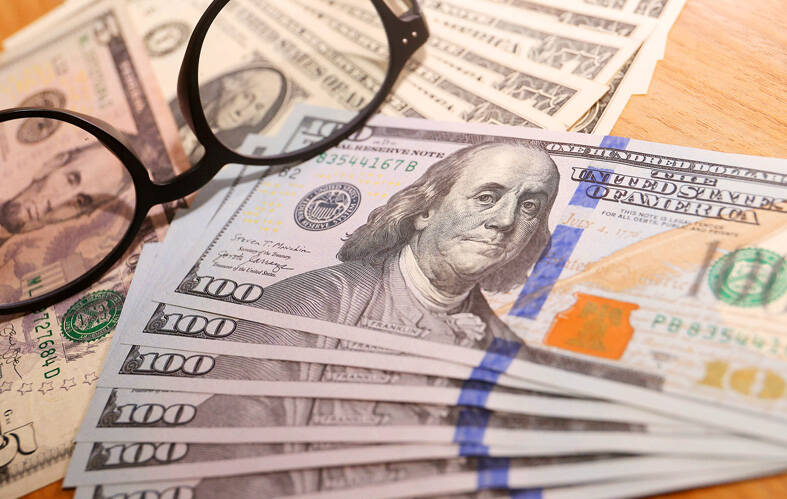Foreign direct investment (FDI) approved by the government last month hit the highest level this year, but the figure for the first six months of this year was down nearly 27 percent from the same period last year, the Investment Commission said yesterday.
FDI is measured based on the investment activities of foreign firms, such as the incorporation of a subsidiary or joint venture, a cash injection into a local unit, or mergers or stake acquisitions of domestic firms. Taiwan’s FDI excludes investments from China.
The commission approved US$2.14 billion in FDI last month, down 52.3 percent from a year earlier.

Photo: CNA
However, last month’s figure surged 121.64 percent from the previous month, as Singapore-based DBS Bank Ltd (星展銀行) gained approval to inject NT$52 billion (US$1.67 million) in new capital into DBS Bank Taiwan (星展台灣) to fund its subsidiary’s acquisition of Citibank Taiwan Ltd’s (花旗台灣) consumer banking business, the commission said.
Total foreign direct investment in the first six months was US$6.42 billion, a 26.97 percent decrease from the same period last year, which the commission attributed to a relatively high comparison base last year, when Denmark’s Orsted Wind Power TW Holding A/S won approval to invest NT$87.19 billion in offshore wind projects in Taiwan and Costco Wholesale Australia Pty Ltd secured permission to invest US$1.05 billion in expanding its local wholesale and logistics businesses.
Meanwhile, investments from January to last month from countries that are part of the government’s New Southbound Policy increased 57.87 percent annually to US$2.24 billion, with the sources of investment coming mainly from Singapore, Malaysia and Thailand, the commission said
As for investments by Chinese firms, the commission approved US$16.65 million in the first six months, down 2.23 percent from a year earlier, it said.
In terms of outbound investment by Taiwanese individuals and businesses in nations excluding China, the commission said it approved US$8.97 billion in the first six months, an annual increase of 112.78 percent and boosted mainly by Taiwan Semiconductor Manufacturing Co’s (台積電) investment in its fab in Arizona, as well as Yageo Corp’s (國巨) equity investment in Hudson Holdco France under Schneider Electric SE.
Outbound investments to China increased 6.38 percent year-on-year to US$1.91 billion in the first six months, while those to New Southbound Policy countries grew 2.94 percent to US$2.13 billion, which the ministry attributed to local firms’ increasing investments in Singapore, Vietnam and Malaysia.

Taiwan Semiconductor Manufacturing Co (TSMC, 台積電) yesterday said that its investment plan in Arizona is going according to schedule, following a local media report claiming that the company is planning to break ground on its third wafer fab in the US in June. In a statement, TSMC said it does not comment on market speculation, but that its investments in Arizona are proceeding well. TSMC is investing more than US$65 billion in Arizona to build three advanced wafer fabs. The first one has started production using the 4-nanometer (nm) process, while the second one would start mass production using the

A TAIWAN DEAL: TSMC is in early talks to fully operate Intel’s US semiconductor factories in a deal first raised by Trump officials, but Intel’s interest is uncertain Broadcom Inc has had informal talks with its advisers about making a bid for Intel Corp’s chip-design and marketing business, the Wall Street Journal reported, citing people familiar with the matter. Nothing has been submitted to Intel and Broadcom could decide not to pursue a deal, according to the Journal. Bloomberg News earlier reported that Taiwan Semiconductor Manufacturing Co (TSMC, 台積電) is in early talks for a controlling stake in Intel’s factories at the request of officials at US President Donald Trump’s administration, as the president looks to boost US manufacturing and maintain the country’s leadership in critical technologies. Trump officials raised the

‘SILVER LINING’: Although the news caused TSMC to fall on the local market, an analyst said that as tariffs are not set to go into effect until April, there is still time for negotiations US President Donald Trump on Tuesday said that he would likely impose tariffs on semiconductor, automobile and pharmaceutical imports of about 25 percent, with an announcement coming as soon as April 2 in a move that would represent a dramatic widening of the US leader’s trade war. “I probably will tell you that on April 2, but it’ll be in the neighborhood of 25 percent,” Trump told reporters at his Mar-a-Lago club when asked about his plan for auto tariffs. Asked about similar levies on pharmaceutical drugs and semiconductors, the president said that “it’ll be 25 percent and higher, and it’ll

CHIP BOOM: Revenue for the semiconductor industry is set to reach US$1 trillion by 2032, opening up opportunities for the chip pacakging and testing company, it said ASE Technology Holding Co (日月光投控), the world’s largest provider of outsourced semiconductor assembly and test (OSAT) services, yesterday launched a new advanced manufacturing facility in Penang, Malaysia, aiming to meet growing demand for emerging technologies such as generative artificial intelligence (AI) applications. The US$300 million facility is a critical step in expanding ASE’s global footprint, offering an alternative for customers from the US, Europe, Japan, South Korea and China to assemble and test chips outside of Taiwan amid efforts to diversify supply chains. The plant, the company’s fifth in Malaysia, is part of a strategic expansion plan that would more than triple